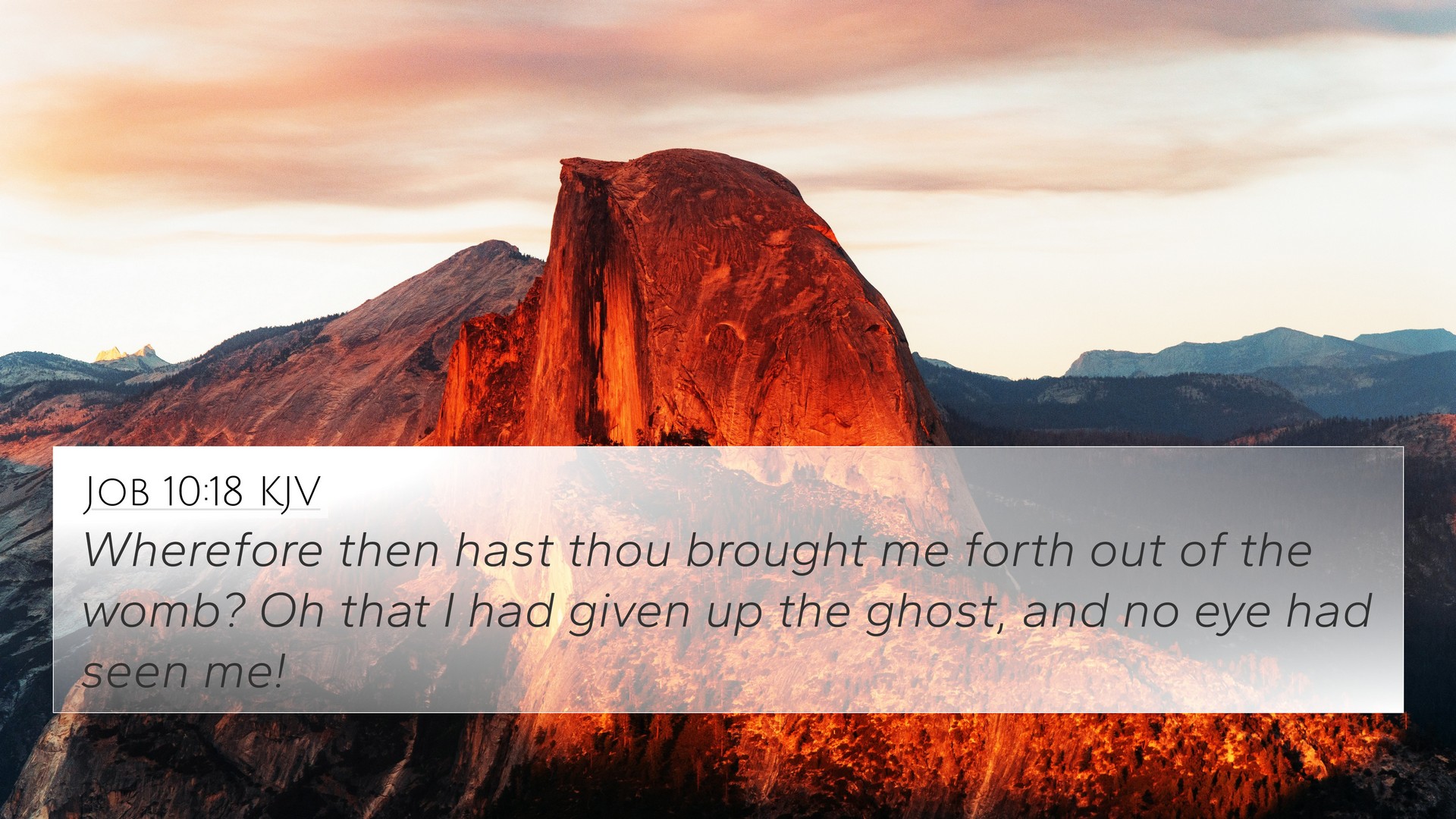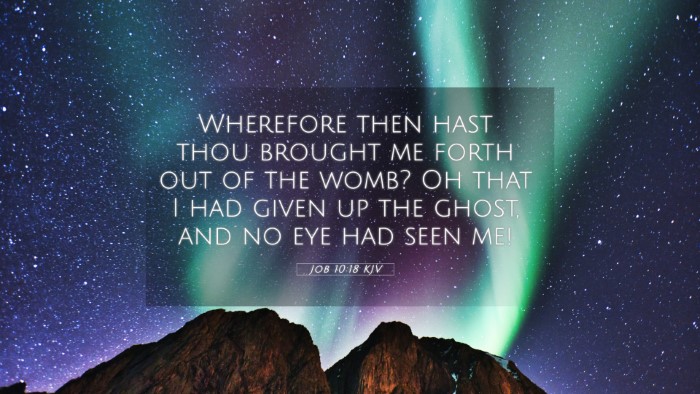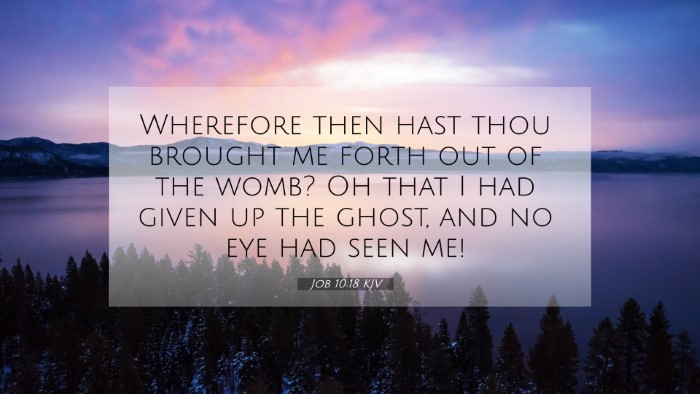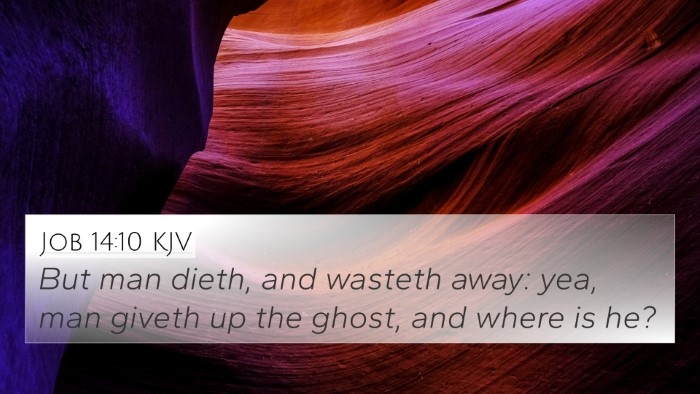Old Testament
Genesis Exodus Leviticus Numbers Deuteronomy Joshua Judges Ruth 1 Samuel 2 Samuel 1 Kings 2 Kings 1 Chronicles 2 Chronicles Ezra Nehemiah Esther Job Psalms Proverbs Ecclesiastes Song of Solomon Isaiah Jeremiah Lamentations Ezekiel Daniel Hosea Joel Amos Obadiah Jonah Micah Nahum Habakkuk Zephaniah Haggai Zechariah MalachiJob 10:18 Similar Verses
Job 10:18 Cross References
Wherefore then hast thou brought me forth out of the womb? Oh that I had given up the ghost, and no eye had seen me!
Uncover the Rich Themes and Topics of This Bible Verse
Listed below are the Bible themes associated with Job 10:18. We invite you to explore each theme to gain deeper insights into the Scriptures.
Job 10:18 Cross Reference Verses
This section features a detailed cross-reference designed to enrich your understanding of the Scriptures. Below, you will find carefully selected verses that echo the themes and teachings related to Job 10:18 KJV. Click on any image to explore detailed analyses of related Bible verses and uncover deeper theological insights.

Jeremiah 20:14 (KJV) »
Cursed be the day wherein I was born: let not the day wherein my mother bare me be blessed.

Job 3:10 (KJV) »
Because it shut not up the doors of my mother's womb, nor hid sorrow from mine eyes.

Job 11:20 (KJV) »
But the eyes of the wicked shall fail, and they shall not escape, and their hope shall be as the giving up of the ghost.
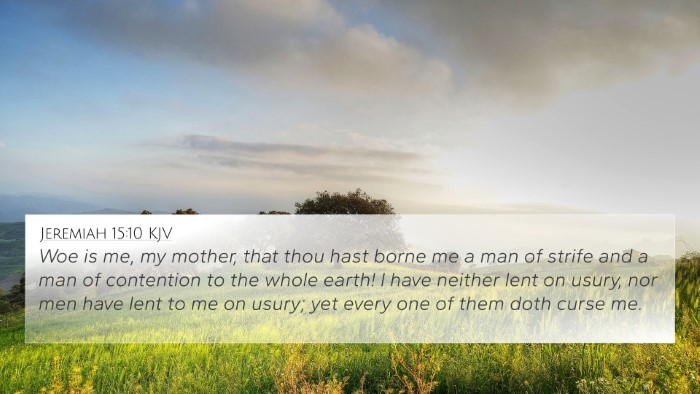
Jeremiah 15:10 (KJV) »
Woe is me, my mother, that thou hast borne me a man of strife and a man of contention to the whole earth! I have neither lent on usury, nor men have lent to me on usury; yet every one of them doth curse me.

Matthew 26:24 (KJV) »
The Son of man goeth as it is written of him: but woe unto that man by whom the Son of man is betrayed! it had been good for that man if he had not been born.
Job 10:18 Verse Analysis and Similar Verses
Understanding Job 10:18
Job 10:18: "Wherefore then hast thou brought me forth out of the womb? Oh that I had never been born, or had died when I came out of the belly."
Overview
The verse stands as a poignant cry from Job, expressing his despair and questioning the purpose of his existence amidst suffering. In this verse, Job bemoans his birth, feeling that life has brought him nothing but pain.
Interpretation from Public Domain Commentaries
-
Matthew Henry:
Matthew Henry reflects on the deep sorrow Job expresses. He interprets this verse as Job lamenting the tremendous agony he endures, feeling that life itself is not worth the suffering he experiences. Henry emphasizes the emotional turmoil and the feeling of futility Job faces, stating that Job's wish to have died at birth reveals his profound distress.
-
Albert Barnes:
Albert Barnes notes that Job's rhetorical questioning serves to express a universal human emotion: the questioning of life when faced with extreme suffering. He elucidates that Job is expressing a desire for relief from the agony of existence and a wish that such pain had never occurred. Barnes urges readers to reflect on the depths of despair that can lead one to such thoughts.
-
Adam Clarke:
Adam Clarke suggests that this verse reflects Job's deep introspection and existential crisis. Clarke emphasizes Job's struggle to find meaning in suffering and his desire to understand why he was allowed to live only to suffer. Clarke’s analysis brings forth the idea that Job’s question should prompt readers to consider the nature of suffering and divine sovereignty.
Thematic Connections and Cross-References
Job 10:18 resonates profoundly with several other biblical passages, elaborating on themes of suffering, existential reflection, and the human condition:
- Psalm 139:13-16: This passage discusses God's intimate involvement in our creation, paralleling Job's feeling of being uniquely aware of his suffering.
- Jeremiah 20:17: Jeremiah shares similar sentiments about wishing he had never been born, providing a comparison of prophetic despair.
- Ecclesiastes 4:3: Ecclesiastes offers a somber reflection on life’s struggles, further highlighting Job’s sentiments about the challenges of living.
- Romans 8:18: This New Testament reflection discusses present sufferings in light of future glory, suggesting a contrast to Job's despair.
- Job 3:11-12: In earlier chapters, Job explicitly curses the day of his birth, showing a consistent theme of wishing for death over suffering.
- Isaiah 49:1: God's calling of His people from birth showcases how life has purpose, contrasting Job's feelings of purposelessness.
- Matthew 26:38: In the New Testament, Jesus expresses sorrowful anguish in Gethsemane, paralleling consistent themes of struggle in the face of suffering.
- Lamentations 3:38-39: This passage reflects on why people should question life amid suffering, echoing Job's inquiries about pain.
- James 1:2-4: Here, suffering is seen as a means to grow in faith, presenting a resolution to Job's despair.
- Philippians 1:21: Paul reflects on life and death, suggesting a redeeming purpose even in painful existence, unlike Job's despair.
Connections Between Bible Verses
This verse's themes link Job's personal suffering to broader biblical narratives about the nature of human pain and divine providence. Understanding these connections can enhance one’s comprehension of biblical literature and the thematic continuities throughout scripture.
Tools for Bible Cross-Referencing
For those engaging in a deeper study of cross-referenced themes, consider utilizing these tools:
- Bible Concordance: Helps locate verses and themes effectively across scripture.
- Bible Cross-Reference Guide: A tool that links similar scriptures thematically, enhancing inter-Biblical dialogue.
- Comprehensive Bible Cross-Reference Materials: Useful for in-depth scriptural studies and sermon preparation.
Conclusion
Job 10:18 encapsulates a profound moment of human anguish that resonates through scriptures. By exploring its depth through the lens of public domain commentaries and thematic connections to other biblical texts, readers can find a richer understanding of suffering, purpose, and the quest for meaning in life.
Utilizing effective Bible cross-referencing methods allows for deeper theological insights and connections, aiding in both personal reflection and academic study.
